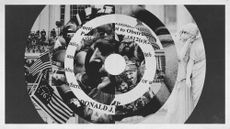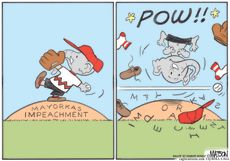Why economists should try to measure happiness
Zachary Karabell's new book, The Leading Indicators, shows the problem of relying too heavily on traditional economic measurements

When discussing media, the philosopher Marshall McLuhan once said, "We shape our tools and thereafter our tools shape us." Much the same principle applies to economic indicators; once they have been developed they begin to shape our experience and perceptions in ways we rarely realize. Most of us accept numbers as devoid of ideology, as accurate and unbiased descriptions of the world we inhabit — this is their allure.
In his new book The Leading Indicators, the economist Zachary Karabell takes the opposite tack, arguing that "the world these statistics say we are living in and the world we are actually living in often diverge." Like Freud, Karabell investigates the unconscious assumptions that permeate our lives, in his case focusing on our dependence on statistics.
Freud, in fact, makes a few appearances in the book. The varied economists who developed national indicators (Fisher, Mitchell, Burns, Kuznets), Karabell explains, suffered from "physics envy." But economics is not physics. Indicators, rather than representing some objective view of reality, are injected with controversial assumptions.
Subscribe to The Week
Escape your echo chamber. Get the facts behind the news, plus analysis from multiple perspectives.

Sign up for The Week's Free Newsletters
From our morning news briefing to a weekly Good News Newsletter, get the best of The Week delivered directly to your inbox.
From our morning news briefing to a weekly Good News Newsletter, get the best of The Week delivered directly to your inbox.
Karabell writes, "The leading indicators are the products of a particular phase of Western history." In this phase, economics was seen as a mechanism, rather than a human endeavor subject to what Keynes called the "animal spirits." The economists therefore "invented statistics to measure material output. And if economies became unstable and unbalanced, it was because the wrong tools were being used or because the data and the statistics were faulty."
In the years following World War II, national statistics took on a "utopian" bent. Karabell reminds us, if we ever knew, that the U.N. Declaration of Human Rights also included economic rights, which were "characterized at the time as human rights on par with freedom of religion and the rule of law, included the right to sufficient food, shelter, clothes, leisure, health care, and a safety net for unemployment, disability, disease, and old age."
To ensure these goals were met, the U.N. created a committee to develop "National Income Statistics." The Consumer Price Index was devised to ensure that wages and benefits kept up with higher prices. Its various iterations were often met with vehement disdain from workers and union organizers who called the Core CPI (which excludes more volatile energy and food prices) "inflation minus whatever gets more expensive." Unemployment numbers essentially created the idea of unemployment — after all, farmers could be destitute, but they were not considered "unemployed" in the sense we think of now, because they hadn’t previously been paid by an employer.
Karabell tells the story of statistics vividly, illuminating the forgotten characters who shaped our numbers. Ethelbert Stewart, "what Mark Twain would have been had Twain been a statistician," once threatened to burn Bureau of Labor Statistics data when Congress wanted the agency to analyze individual car manufacturers. Frances Perkins, who pushed for the creation of the unemployment rate, was the first woman to serve in a Cabinet-level position (in FDR's administration), and was therefore the first woman in American history to be in line for the presidency.
Sign up for Today's Best Articles in your inbox
A free daily email with the biggest news stories of the day – and the best features from TheWeek.com
There are also many cocktail party-ready anecdotes. In 1992, when the White House Council of Economic Advisers announced that economic growth would be slower in the second quarter than the first, George H.W. Bush said, "This is the worst news I've ever heard" — and then promptly lost the election. When Warren Harding first attempted to discern the unemployment rate in 1920, "there were such divergent opinions about the numbers that the attendees put the question to a vote," Karabell writes. If anything were to disprove Carroll Wright's maxim — "Statistics are the fitting and never-changing symbols...to tell the story of our present state" — it is certainly this anecdote.
The Leading Indicators doesn't just tell the stories of the people behind the statistics; Karabell also describes how the statistics are compiled and kept. For instance, travel expenditures "come from airport surveys of travelers and tour groups. This is not rocket science." Anyone who has filled out such forms on a whim may find their trust in these statistics diminished by this factoid.
The indicators have become so deeply embedded in the public consciousness that they influence markets, which means they must be closely protected. In an enlightening paragraph, Karabell describes the process:
Within the BLS, procedures are just as stringent. The staff members responsible for compiling the numbers encrypt their computers and store the data into secure locations every time they get up to use the bathroom. The janitors and custodial workers don't even empty the trash in the week leading up to the release. Only the White House receives an early copy of the report, in a locked and guarded suitcase, Thursday evening, 12 hours before the report is issued to the public the following morning. [The Leading Indicators]
Although Karabell's diagnosis is correct, his cure for the failure of statistics is ultimately unsatisfying. Betraying a truly 21st-century mindset, his solution is "tailored" indicators. He argues not for a broad measure of society, but rather "bespoke" indicators that "empower" individuals: "Our reliance on 20th-century leading indicators to craft a common narrative of 'the economy' is an obstacle." One such "bespoke" indicator is the Office of Financial Research, established in 2011 to develop statistics that "might identify critical problems before they again threaten to bring down the global financial system."
Such statistics are welcome, but they will still run into the same problems the old statistics did — simply identifying and measuring a problem will not solve it. Karabell's palliative still faces the conundrum Freud observed in Civilization and Its Discontents, "It is impossible to escape the impression that people commonly use false standards of measurement — that they seek power, success, and wealth for themselves and admire them in others, and that they underestimate what is of true value in life."
A better path is not to seek precise, fitted, individualistic metrics, but rather a more holistic vision of society. The small kingdom of Bhutan, squeezed between India and China, used to try to quantify Gross National Happiness (GNH). Its former prime minister explained in 2008, "We distinguish between the happiness in GNH from the fleeting, pleasurable feel-good moods so often associated with that term. We know that true happiness cannot exist while other suffer, and comes only from serving others, living in harmony with nature, and realizing our innate wisdom and the true and brilliant nature of our own minds."
This is not just happy talk, and the recognition that indicators are failing is not limited to small, mountainous kingdoms. In France, then-President Nicolas Sarkozy asked Joseph E. Stiglitz, Amartya Sen, Jean-Paul Fitoussi to investigate the limits of GDP. In 2010 they produced a short book, Mismeasuring Our Lives, in which Sarkozy notes in the foreword, "Our world, our society, and our economy have changed, and the measures have not kept pace." As a result of his efforts, Insee, the French statistics agency, has begun incorporating new measures into its accounting process, and released numerous reports on inequality, quality of life, and sustainability. The European Union, the Organization for Economic Cooperation and Development, and the U.N. have all been developing new measures based on the Stiglitz commission's recommendations.
In Britain, Prime Minister David Cameron, a Tory, launched a similar well-being inquiry with the intention of supplementing GDP with General Well-Being (GWB). So far, the Office of National Statistics has released two national reports (based on interviews with some 150,000 British citizens) that have generated many insights and much discussion.
In the United States, Daniel Kahneman and Alan Krueger have developed the "U-Index," a "numerical representation of how much time people spend doing things they find unpleasing, such as commuting to work in heavy traffic, doing the laundry, shopping for food, or taking care of young children." Across the country, states like Vermont, Maryland, and Oregon are implementing the Genuine Progress Indicator, which takes into account 26 indicators of progress, to better measure the environmental and social impacts of growth, as well as its distribution.
Still, in an era when governments pursued massive austerity programs on little more than an Excel spreadsheet error, Karabell's investigation into the motives and misuses of statistics is all the more important. Ultimately, the shift from national statistics that measure production to those that measure well-being will be a shift toward a humanistic economy.
Create an account with the same email registered to your subscription to unlock access.
-
 'A speaker courageous enough to stand up to the extremists in his own party'
'A speaker courageous enough to stand up to the extremists in his own party'Instant Opinion Opinion, comment and editorials of the day
By Harold Maass, The Week US Published
-
 How could the Supreme Court's Fischer v. US case impact the other Jan 6. trials including Trump's?
How could the Supreme Court's Fischer v. US case impact the other Jan 6. trials including Trump's?Today's Big Question A former Pennsylvania cop might hold the key to a major upheaval in how the courts treat the Capitol riot — and its alleged instigator
By Rafi Schwartz, The Week US Published
-
 Today's political cartoons - April 18, 2024
Today's political cartoons - April 18, 2024Cartoons Thursday's cartoons - impeachment Peanuts, record-breaking temperatures, and more
By The Week US Published